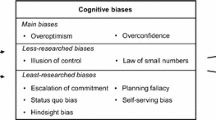Abstract
Entrepreneurs typically live with the ever-present threat of business failure arising from limited financial resources and aggressive competition in the marketplace. Under these circumstances, conflicting priorities arise and the entrepreneur is thus faced with certain dilemmas. In seeking to resolve these, entrepreneurs must often rely on their own judgment to determine “what is right”. There is thus a need for a technique to assist them decide on a course of action when no precedent or obvious solution exists. This research paper examines how entrepreneurs experience and deal with these dilemmas. The research is based on interviews with seven entrepreneurs in established service-oriented ventures, which gave rise to 26 dilemmas. These dilemmas were analyzed by making use of the Synergy Star technique, which is introduced here as a tool that is useful in defining any dilemma, isolating the ethical component, and resolving the dilemma in a way that is congruent with the entrepreneur’s personal world-view.
Similar content being viewed by others
References
Banfe C. (1991). Entrepreneur - from Zero to Hero.Van Nostrand Reinhold, New York
Baumol W. J. (1990). Entrepreneurship: Productive, Unproductive and Destructive. Journal of Political Economy 98(5):893–921
Birley S., Westhead P. (1994). A Taxonomy of Business Start-up Reasons and Their Impact on Firm Growth and Size. Journal of Business Venturing 9:7–31
Bucar B., Glas M., Hisrich R. D. (2003). Ethics and Entrepreneurs: An International Comparative Study. Journal of Business Venturing 18:261–281
Cialdini R. B. (1988). Influence. Science and Practice (2nd ed.). HarperCollins, New York
Cooper A. C. (2005). History of the Academic Study of Entrepreneurship. In: Hitt M. A., Ireland R. D. (eds) The Blackwell Encyclopedia of Mangagement (2nd ed), Volume III: Entrepreneurship. Blackwell, Maden, MA, pp. 144–146
Davidsson P. (2004). Researching Entrepreneurship. Springer, New York
Delmar F. (2000). The Psychology of the Entrepreneur. In: Carter S., Jones-Evans D. (eds) Enterprise & Small Business: Principles, Practice and Policy. Financial Times, Harlow, pp. 132–154
Fligstein N. (2006). Sense Making and the Emergence of a New Form of Market Governance. American behavioural Scientist 49(7):949–960
Giorgi A. (1985). Sketch of a Psychological Phenomenological Method. In: Giorgi A. (ed) Phenomenology and Psychological Research. Duquesne University Press, Pittsburgh, PA, pp. 8–22
Goldrattt E. M. (1994). It’s Not Luck. North River Press, Great Barrington
Granovetter M. (1992). Economic Institutions as Social Constructions: A Framework for Analysis. Acta Sociologica 35(1):3–11
Hébert R.F., Link A.N. (1988). The Entrepreneur. Mainstream Views and Radical Critiques (2nd edn). Praeger, New York
Jackson N. (1991). Case Material in an Ethics Workshop: A Reply to Patrick Maclagan. Management Education and Development 22:97–100
Kierkegaard S. (1959). Either / Or. Volume 2. Doubleday, New York
Kirzner I.M. (1973). Competition and Entrepreneurship. University of Chicago Press, Chicago, IL
Knowlton, B. 2002. Bush Vows Tough Fight Against Corporate Fraud. International Herald Tribune. 10 July 2002, pp l and 4.
Kourilsky M. L., Walstad W. B. (eds) (2003). Social Entrepreneurship. Senate Hall, Dublin
Maitland I. (2002). The Human Face of Self-interest. Journal of Business Ethics 38:3–17
Intrapreneuring. Harper & Row, New York
Robinson, D.A. 2002. A Phenomenological Study of How South African Entrepreneurs Experience and Deal with Ethical Dilemmas. PhD thesis. Rhodes University, Grahamstown
Sapienza H.J., Korsgaard M.A., Forbes D.P. (2003). The Self-determination Motive and Entrepreneurs’ Choice of Financing. In: Katz J., Shepherd D. (eds) Cognitive Approaches to Entrepreneurship Research, Vol 6. Elsevier/JAI Press, Oxford, U.K., pp. 107–140
Schumpeter J.A. (1934). The Theory of Economic Development. Harvard University Press, Cambridge, MA
Shane S., Venkataraman S. (2000). The Promise of Entrepreneurship as a Field of Research. Academy of Management Review 25(1):217–226
Sharma P., Chrisman J. J. (1999). Toward a Reconciliation of the Definitional Issues in the Field of Corporate Entrepreneurship. Entrepreneurship Theory & Practice 233:11–27
Solymossy E. (1997). Push/Pull Motivation: Does it Matter in Venture Performance?. In: Reynolds P. D. et al (eds) Frontiers of Entrepreneurship Research 1997. Babson College, Wellesley, MA
Stevenson H. H., Jarillo J. C. (1990). A Paradigm of Entrepreneurship: Entrepreneurial management. Strategic Management Journal 11:17–27
Teal E. J., Carroll A. B. (1999). Moral Reasoning Skills: Are Entrepreneurs Different?. Journal of Business Ethics 19:229–240
Vesalainen J., Pikhala T. (1999). Motivation Structure and Entrepreneurial Intentions. In: Reynolds P. D. et al (eds) Frontiers of Entrepreneurship Research 1999. Babson College, Wellesley, MA
Waters J., Bird F. B., Chant P. D. (1986). Everyday Moral Issues Experienced by Managers. Journal of Business Ethics 5(5):373–384
Wiklund J., Davidsson P., Delmar F. (2003). Expected Consequences of Growth and their Effect on Growth Willingness in Different Samples of Small Firms. Entrepreneurship Theory & Practice 27(Spring):247–269
Zahra S. A. (1993). Environment, Corporate Entrepreneurship, and Financial Performance: A Taxonomic Approach. Journal of Business Venturing 8:319–340
Author information
Authors and Affiliations
Corresponding author
Additional information
Dr. David Robinson lectures in Entrepreneurship and Business Ethics at Queensland University of Technology and Bond University in Australia and is Visiting Professor at Shanghai Jiao Tong University in China. Himself an entrepreneur and director of companies with varied business interests, he holds a Master of Science from Brunel University, London, an MBA from Newport University, California and a Ph.D. from Rhodes University, South Africa. Dave is a past surfing and lifesaving champion and is known around the world as ‘Dr. Dave - the Surfing Professor’.
Per Davidsson is Professor of Entrepreneurship and Director of Research at Queensland University of Technology, Australia and Professor of Entrepreneurship at the Jonkoping International Business School in Sweden.
Hennie van der Mescht is Associate Professor and Head of the Education Department at Rhodes University, South Africa.
Philip Court is Associate Professor and Head of the Management Department at Rhodes University, South Africa.
Appendix
Appendix
Rights and permissions
About this article
Cite this article
Robinson, D.A., Davidsson, P., van der Mescht, H. et al. How Entrepreneurs Deal with Ethical Challenges – An Application of the Business Ethics Synergy Star Technique. J Bus Ethics 71, 411–423 (2007). https://doi.org/10.1007/s10551-006-9148-8
Received:
Revised:
Accepted:
Published:
Issue Date:
DOI: https://doi.org/10.1007/s10551-006-9148-8




